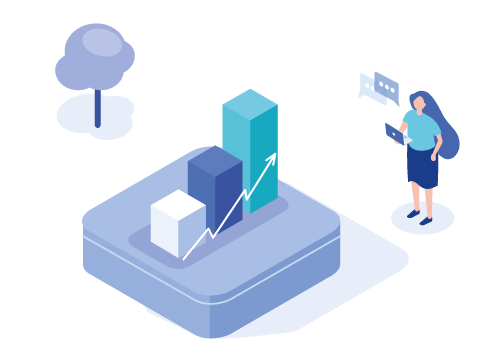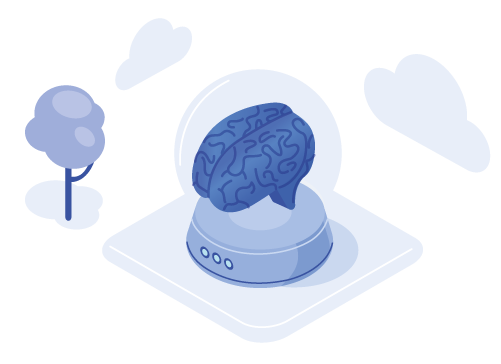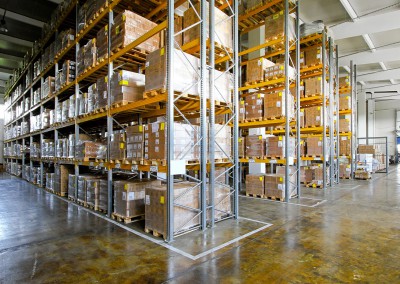You should always expect anything.
Even the best.
Numbers are our profession. We are just as familiar with current mathematical methods as we are with optimization algorithms and software-technical realization. Why is this relevant for you? Because you can always count on us. Math.Tec develops optimization models for you in the areas of warehouse logistics, production logistics, transport logistics and industry and implements them concretely. We accompany and support you in efficiency increase and cost reduction programs on the basis of customized mathematical optimization approaches. And that’s a calculation that works.
Mathematical models make it possible to profitably answer questions in logistics, engineering and finance as well as in industry, business and administration.
The logical way
Mathematical modeling means expressing a real problem in the language of mathematics in order to solve this very problem with the help of mathematical tools. The starting point is a real problem. From this we develop a mathematical problem, a picture of reality, which we solve using mathematical methods. We then interpret the mathematical solution in terms of its real-world meaning and check its relevance.
Model criteria
- Correctness
- admissibility
- expediency
Different model approaches – deterministic or stochastic, discrete or continuous – are combined appropriately depending on the task.


Optimization
Of course, there are many permissible solutions. However, only one of them is optimal. We find it with mathematical optimization.
Solutions with system
Mathematical optimization determines the optimal solution in a set of admissible solutions. This set is defined by restrictions – also called constraints – over the decision variable.
Depending on the structure of the constraints, special mathematical optimization problems are obtained. While military applications were initially in the foreground as a result of the Second World War, optimization problems are now applied in logistics, industry and business.
Each category of optimization problem requires a specially adapted solution algorithm. With modern optimization methods we are able to solve problems with many thousands of variables and constraints.
Simulation
Mathematical simulation is part of the development process of complex dynamic systems. For knowledge about the real system, we perform experiments on a “virtual” model.
The better reality
In a simulation, we perform various “virtual” experiments on a model and thus gain knowledge about the real system. This mathematical simulation or computer simulation is an essential part of the development of complex dynamic systems. It makes it possible to evaluate a mathematical model.
If one is also dealing with a large amount of data, simulation results or even measurement data must be visualized. The basis of a computer simulation is usually a numerical method or an algorithm.
With it we solve the given mathematical problem approximatively. A run on the computer with concrete parameter values represents a simulation experiment, the results of which are interpreted and transferred to the real system. Such a simulation is used for logistic, technical or financial requirements.


Quantum Computing
Supercomputers of the future? We are convinced that quantum computers will become established and are already developing applications with international specialists in the early stages.
On the path to quantum superiority
We identify suitable use cases for Quantum Computing in logistics and industry and develop suitable Quantum Computing (QC) and hybrid QC/HPC (High Performance Computing) algorithms for them. Among other things, we are also involved in the development of the first fully integrated hybrid QC/HPC infrastructure in Europe, a lead project of Quantum Austria. For this, we have current generation quantum computers at our disposal.
A quantum computer, unlike a classical computer, does not process data on the basis of the laws of classical physics, but with special algorithms using quantum mechanical principles. As a result, quantum computers are able to solve complex tasks within the shortest possible time, the complexity of which classical computers/high performance computers cannot match.
Artificial intelligence
Big Data, machine learning and talking machines: Our lives are no longer conceivable without artificial intelligence. We develop suitable algorithms and integrate them into your business applications.
The balance of man and machine
Artificial Intelligence – AI for short – has arrived in everyday life. In the form of digital assistants and autonomous vehicles, talking devices and cooperative robots, we now come into contact with Artificial Intelligence on a daily basis. The digitization of all sectors of the economy is advancing rapidly.
AI’s machine learning techniques enable us to identify complex relationships in large amounts of data – this is becoming increasingly important due to Big Data. They also help us predict future events based on the past.
AI is creating a new communication interface with our homes, our workplaces, cars, wearables. Algorithms have always been an integral part of Math.Tec’s software solutions. We develop AI algorithms and integrate them into our customers’ business applications.

High Performance Integrated Quantum Computing (HPQC)
Within this project we will integrate a quantum computer (QC) directly into an Austrian high-performance computing facility (HPC), thus realising the first fully integrated hybrid QC/HPC infrastructure in Europe.
- University of Innsbruck | Experimental Physics
- Alpine Quantum Technologies GmbH
- Math.Tec GmbH | Vienna
- IBM-Research | Zürich
- University of Innsbruck | Research Area Scientific Computing
- TU Vienna | Institute of Atomic and Subatomic Physics
- TU Vienna | Institute of Information Systems Engineering
- Johannes Kepler University Linz | Institute for Integrated Circuits

Products
MATH.PICK
Warehouse Optimization System
Depending on the initial situation, we can achieve savings of up to 20 percent by optimally positioning the goods in the warehouse. Converted, this naturally means a significant reduction in overall picking costs. And a major advantage for your company.
MATH.TOUR
Tour optimization
Effective route plans are not witchcraft. But it is a calculation: We find a solution adapted to your individual circumstances, such as delivery details, time windows or vehicle size, and optimize the processes using mathematical algorithms. That pays off!
MATH.PACK
3D packing pattern calculation of load carriers
Being in the picture about success: MATH.PACK delivers a packing pattern optimized for volume and stability using item dimensions and individual item characteristics. This allows us to ensure the optimal utilization of load carriers.
 MATH.PICK
MATH.PICK


